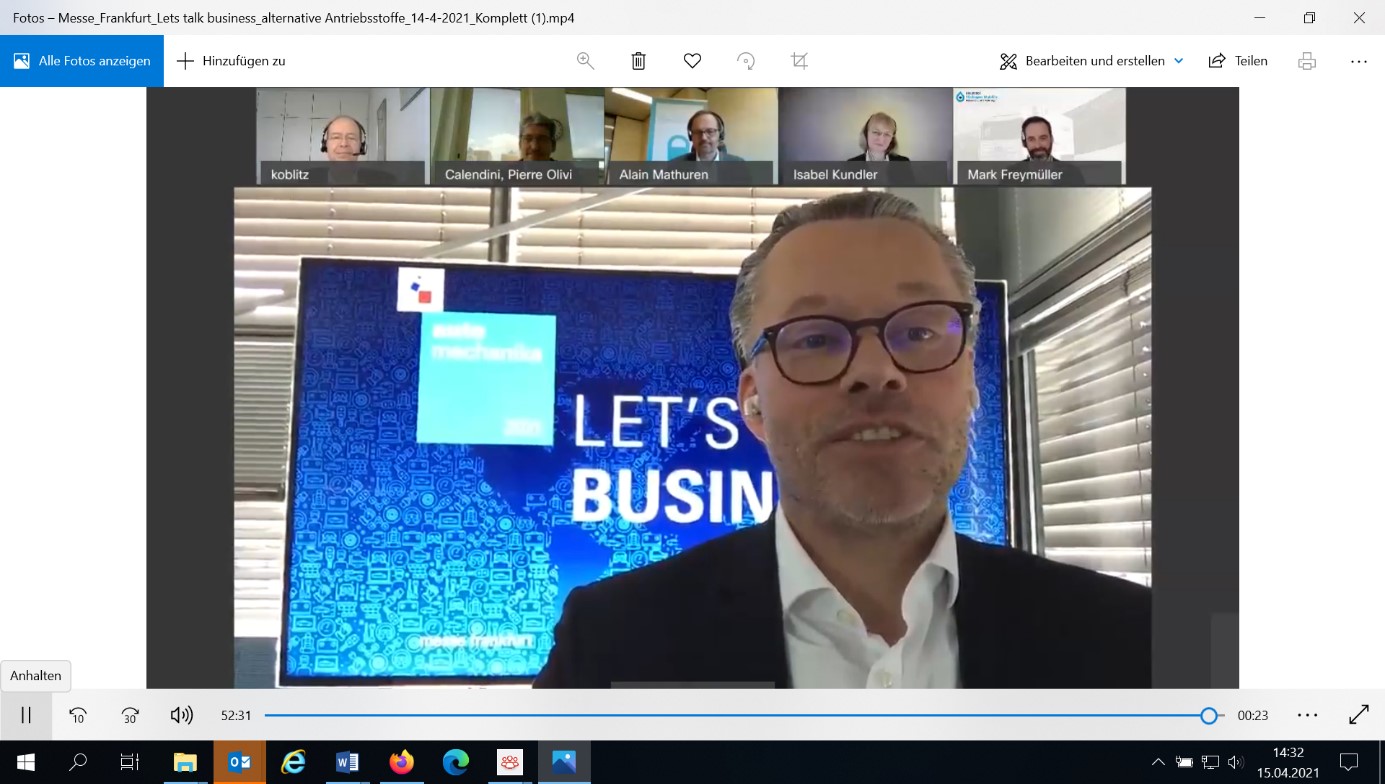Hydrogen, e-fuels, biofuels, or electricity? At the second talk in the ‘Let’s talk business’ series, Olaf Mußhoff, Director of Automechanika Frankfurt, moderated a discussion in which international companies from the automotive industry talked with manufacturers of alternative fuels and industry associations about which fuels were suitable for various forms of mobility. Participants included Pierre Olivier Calendini, Chief Representative of the Aramco Fuel Research Center, Frank Müller, Director of the Capital City Office of the German Federal Association for eMobility (BEM e.V.), Dr. Isabel Kundler, Project Coordinator at Dechema e.V., Alain Mathuren, Communication Director at FuelsEurope, Mark Freymüller, CEO of Hyundai Hydrogen Mobility, and Dr. Axel Koblitz, Managing Director of the German Federation for Motor Trades and Repairs (ZDK).
Despite the controversial nature of some of the topics, a majority of the guests agreed that it would be necessary to use all the available technologies – including hydrogen-powered fuel cells, electric drive systems, and synthetic fuels such as e-fuels and renewable fuels (‘re-fuels’) – to make mobility as climate-neutral as possible. Mark Freymüller, CEO of Hyundai Hydrogen Mobility: “We need to find and use every possibility we have to reduce CO2 emissions. CO2 emissions are our enemy, and we need to join together to combat these.” Because the participants were unanimous in their belief that our rapidly changing climate makes it essential that we slash CO2 emissions as quickly as possible – emissions that are being driven by the use of fossil fuels to power cars, trucks, planes, and ships.
Pierre Olivier Calendini, Chief Representative of the Fuel Research Center at Aramco: “Unfortunately we don’t have a single technology that is able to cover all the sectors, so we need to develop each of them, and we have to create an equitable legal framework that allows these technologies to find a market.” Dr. Isabel Kundler, Project Coordinator at Dechema e.V., also left no doubt about the importance of being open to different technologies today: “We cannot ignore any opportunity, so I believe we need each of these three pillars, and we must be open to a certain amount of diversity in the technologies used.”
Because, as Dr. Axel Koblitz, Managing Director of the German Federation for Motor Trades and Repairs (ZDK), confirmed: "I think we should accept that different purposes require different solutions. And one of these solutions is certainly the battery electric vehicle for short distances, such as when travelling to and from work. But for longer distances, transporting goods – heavy loads in particular, for ships and aircraft, we need different solutions, such as hydrogen and e-fuels.” One point that was made repeatedly was that even existing car fleets could be converted to run on e-fuels or renewable fuels to reduce CO2 emissions or make their operation climate neutral. Frank Müller, Director of the Capital City Office of the German Federal Association for eMobility (BEM e.V.), added that: “E-Fuels make sense if we are talking about the fleets that are already on the road. But if we're talking about the future, we need to shift towards electric vehicles or maybe hydrogen for trucks, ships and planes.”
Alain Mathuren, Communication Director at FuelsEurope, on the other hand, does not think that conventional combustion engines are a thing of the past: “Because internal combustion engines are not the problem, but rather the fuel we use. We can decarbonise internal combustion engines by using synthetic e-fuels or renewable fuels made from biomass, waste and recycled CO2.” Another argument that was discussed involved the possible social impact of an across-the-board electrification of personal transport. To ensure that less well-off EU citizens are not left behind, they should be able to power their personal vehicles with e-fuels or renewable fuels so that they could also enjoy sustainable mobility.
The participants were largely in agreement that electromobility would win out in the sphere of urban mobility, but felt that it was still an open question as to which technologies would come out on top in other areas, such as aviation, truck transport, and shipping. Mark Freymüller summed it up like this: “At the end of the day, the decision will be made by the users. Any alternative needs to be financially attractive for both the operator and the end user. I think each technology has certain advantages and disadvantages, depending on the sector and usability, but we need to do something, and we need to do it quickly. That means we should start off with whatever can have the quickest impact.”
You will find more insights and information on current trends in the English-language video on our website at www.automechanika.com/lets-talk-business.
Press releases & images:
Automechanika @Social Media #AMF21:
facebook.com/automechanika | twitter.com/automechanika_
linkedin.com/showcase/automechanikafrankfurt | instagram.com/automechanika_official
-ENDS-
Background information on Messe Frankfurt
Messe Frankfurt is the world’s largest trade fair, congress and event organiser with its own exhibition grounds. The Messe Frankfurt Group employs around 2,500* people in a total of 30 subsidiaries. The company generated annual sales of approximately €250* million in 2020, following sales of €738 million in 2019. Even in difficult times caused by the coronavirus pandemic, we are globally networked with our industry sectors. We have close ties with our industry sectors and serve our customers’ business interests efficiently within the framework of our Fairs & Events, Locations and Services business fields. One of the Group’s key USPs is its closely knit global sales network, which extends throughout the world. Our comprehensive range of services – both onsite and online – ensures that customers worldwide enjoy consistently high quality and flexibility when planning, organising and running their events. We are expanding our digital expertise with new business models. The wide range of services includes renting exhibition grounds, trade fair construction and marketing, personnel and food services. Headquartered in Frankfurt am Main, the company is owned by the City of Frankfurt (60 percent) and the State of Hesse (40 percent).
For more information, please visit our website at: www.messefrankfurt.com
* preliminary figures 2020
